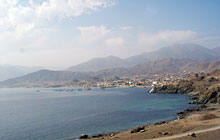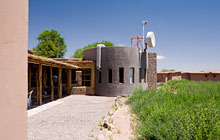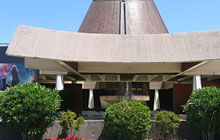Collaborations in Chile
The achievements of the European Southern Observatory (ESO) have partly been made possible thanks to the constant support of the Chilean Government. On its side, ESO has established collaborative programmes with several Chilean organisations, universities and local communities, in order to promote astronomy, science and education in Chile. Moreover, in 1996, an agreement was signed whereby Chilean astronomy has access to up to 10% of the total observing time on ESO telescopes. As part of this agreement, the ESO–Government of Chile Joint Committee was established for the development of astronomy and scientific culture.
Collaborative Programmes
CONICYT
The National Committee for Science, Technology and Research (CONICYT) was created by the Chilean Ministry of Education. ESO regularly contributes to the CONICYT programme and activities at outreach and research levels.
On one hand, ESO participates in the activities developed by Explora CONICYT, one of the programmes created by CONICYT to promote Science and Technology among the general public and especially in schools, through non formal education and outreach activities. Every year, ESO is present during the “Chilean Science Week” organised by Explora, with exhibitions, interactive activities and astronomer’s talks, aimed at promoting astronomy to the Chilean public. ESO astronomers also voluntarily contribute to the “1000 Cientificos, 1000 Aulas” activity, which promotes science in Chilean schools.
On the other hand, CONICYT is institutionally represented in the ESO-Government of Chile Joint Committee; each year it selects scientific and outreach projects that will receive funding from the Joint Committee.
ALMA JAO also established the ALMA-CONICYT Fund to deliver funding to scientific, technical and outreach projects in astronomy. The list of the projects approved by the ALMA-CONICYT Fund since 2005 is available via the following link: http://www.conicyt.cl/astronomia/category/concursos/alma/
More information:
- CONICYT Website
- CONICYT Astronomy Programmes
- Explora Programme
- 1000 Científicos 1000 Aulas
- ALMA Observatory Website
Universidad Católica del Norte
In 1998, ESO and the Universidad Católica del Norte (UCN) signed an agreement to increase the awareness of astronomy in the Antofagasta Region of Chile. Since then, ESO has been financially supporting the Institute of Astronomy at the UCN, which principally focuses on research, but also offers outreach activities for local communities. Members of the general public can regularly participate in public talks, sky observations and initiatives lead by the institute to stimulate interest in astronomy. The UCN also organises training courses for students and participates in science fairs to strengthen local knowledge of astronomy.
More information: Institute of Astronomy–UCN
Contact: Christian Moni Bidin (Director of the Institute of Astronomy–UCN)
Universidad de Antofagasta
ESO and Universidad de Antofagasta signed a cooperation agreement in 2015, to be implemented during 2015–2018 period. The objective of this agreement is to work with the university’s Astronomy Unit to encourage scientific, technical and research cooperation, as well as to increase the impact of astronomy educational programmes and outreach activities in the Region II of Chile. In terms of outreach activities, The Astronomy Unit proposes night observations for the public, an Astronomical Winter School and public talks, often with the participation of volunteer ESO astronomers and engineers.
More information: Astronomy Center of the Universidad de Antofagasta
Contact: Eduardo Unda-Sanzana
ESO Scholarship Programme for Taltal Students
 Taltal is the closest town to the Paranal Observatory. In order to support local education programmes there, and encourage students to continue in education, outstanding undergraduate students from Taltal can apply for an ESO Scholarship to fully cover their education fees. This benefit is renewed annually, after an evaluation of the academic performance of each student. Since 2009, more than 20 students have received complete scholarships.
Taltal is the closest town to the Paranal Observatory. In order to support local education programmes there, and encourage students to continue in education, outstanding undergraduate students from Taltal can apply for an ESO Scholarship to fully cover their education fees. This benefit is renewed annually, after an evaluation of the academic performance of each student. Since 2009, more than 20 students have received complete scholarships.
A separate amount is assigned by ESO each year directly to the Municipality of Taltal, to partially fund up to 40 underprivileged undergraduate students.
The APEX–Sequitor Fund
 The area of San Pedro de Atacama has a unique natural richness, as well as a significant historical and cultural heritage, so its preservation is important for ESO. Funds are assigned annually to miscellaneous cultural, sporting and educational projects led by groups in the Sequitor Community, where APEX has its operations centre. The main objective is to improve the quality of life of the community through economic support to their projects.
The area of San Pedro de Atacama has a unique natural richness, as well as a significant historical and cultural heritage, so its preservation is important for ESO. Funds are assigned annually to miscellaneous cultural, sporting and educational projects led by groups in the Sequitor Community, where APEX has its operations centre. The main objective is to improve the quality of life of the community through economic support to their projects.
ALMA JAO also supports local development in the region of San Pedro de Atacama through the ALMA–II Region Fund.
The Office for the Protection of the Quality of the Skies
In 2002, The Office for the Protection of the Quality of the Skies in Northern Chile (Oficina de Proteccion de la Calidad del Cielo de Norte de Chile–OPCC in Spanish) was jointly funded by the National Committee for the Environment (CONAMA), the Association of Universities for Research in Astronomy (AURA), the Carnegie Southern Observatory (CARSO) and ESO. Its main objective is to raise awareness about light pollution regulation (“Emisión para la Regulación de la Contaminación Lumínica”) by offering advice on the matter, eventually leading to protection of the dark skies and perhaps even improving the situation.
This protection is critical as the regions of Antofagasta, Atacama and Coquimbo in northern Chile have been recognised as the best natural heritage sites for astronomical observation in the Southern Hemisphere. More information can be found here.
Collaboration for Exhibitions about astronomy
Apart from permanent exhibitions in the Visitor Centres of its observatories, ESO also supports several organisations in Chile to develop their own exhibitions about astronomy.
To review ESO collaboration for exhibitions, you can consult this page.
ESO–Government of Chile Joint Committee funded projects
Since 1998, the ESO–Government of Chile Joint Committee has financed postdoctoral fellowships and professorships in astronomy at Chilean universities, infrastructure development, conferences, training for science teachers at primary and secondary level, and astronomy outreach programmes for the general public. These have been financed through a fund which is open to bidding yearly.
The list of the 2018 Proposals to be funded and implemented during 2019-2020 are on the SOCHIAS website.
The public outreach activities funded through this scheme include:
- Digital platform for outreach on the 2019 and 2020 eclipses in Chile, Verde Agency
- Breacking the silence: Reaching further, Sociedad Chilena de Astronomía (SOCHIAS)
- Olympic Games of Astronomy and Astronautics, Sociedad Chilena de Astronomía (SOCHIAS)
- Eclipse party in the III Region in July, 2019, Instituto Milenio de Astrofisica MAS
The list of the 2017 Proposals related to public outreach and implemented in 2018-2019 include:
- NASE Workshop for didactic astronomy in schools, Sociedad Chilena de Astronomía (SOCHIAS)
- The IX Latin American Olympic Games of Astronomy and Astronautics for the first time in Chile, Sociedad Chilena de Astronomía (SOCHIAS)
- Construction of an ELT model for the Museum for Science and Technology (MUCYTEC), Corporacion privada para la Divulgación de la Ciencia y Tecnología (CORPDICYT)
- Astronomy days for girls in schools, Universidad de Chile
- “Breaking the silence” project consisting of a series of talks about astronomy including a sign language interpreter, Sociedad Chilena de Astronomía (SOCHIAS)
Information about former proposals that were funded can be found on the ESO website:
- ESO–Government of Chile Joint Committee funded projects 2009
- ESO–Government of Chile Joint Committee funded projects 2010
- SOCHIAS website
Examples of Significant Astronomy Outreach Projects that have Received the Support of the ESO–Government of Chile Joint Committee
Renovation of the Historic Manuel Foster Observatory
 The aim of this project was to renovate the historic Manuel Foster Observatory and create a centre for astronomy education and outreach. This centre offers themed programmes for students, educators and the general public. The observatory, located atop Cerro San Cristóbal, in central Santiago de Chile, was built early in the 20th century and was donated to the Pontificia Universidad Católica de Chile by one of its former students, Manuel Foster, in 1928. The observatory, which produced the first catalogues of stellar radial velocities of the southern sky, was recently declared a Historic National Monument in Chile.
The aim of this project was to renovate the historic Manuel Foster Observatory and create a centre for astronomy education and outreach. This centre offers themed programmes for students, educators and the general public. The observatory, located atop Cerro San Cristóbal, in central Santiago de Chile, was built early in the 20th century and was donated to the Pontificia Universidad Católica de Chile by one of its former students, Manuel Foster, in 1928. The observatory, which produced the first catalogues of stellar radial velocities of the southern sky, was recently declared a Historic National Monument in Chile.
Year: 2010
Responsible Institution: Pontificia Universidad Católica de Chile (PUC), Santiago, Metropolitan Region.
Contact: David Orellana
Astronomy Park at the USACH Planetarium
 The aim of this project was to establish an Astronomy Park in the green area surrounding the Planetarium in the campus of the Universidad de Santiago de Chile (USACH). The project includes the design, production and installation of a structure inspired by the work of the Chilean artist Roberto Matta. This project was part of “Matta’s itinerary in Chile”, a commemorative activity that took place during 2011 for the centenary of Matta’s birth.
The aim of this project was to establish an Astronomy Park in the green area surrounding the Planetarium in the campus of the Universidad de Santiago de Chile (USACH). The project includes the design, production and installation of a structure inspired by the work of the Chilean artist Roberto Matta. This project was part of “Matta’s itinerary in Chile”, a commemorative activity that took place during 2011 for the centenary of Matta’s birth.
Year: 2010
Responsible Institution: Fundación para el Funcionamiento, Desarrollo y Promoción del Planetario de la USACH, Santiago, Metropolitan Region.
Contact: Alejandro Bascuñán Limon
Website: http://www.planetariochile.cl
You can read more information on this topic on the web page ESO and Chile: More than 50 years of astronomy and cooperation and in the report “Astronomy and Society — Summary of ESO–Chile Cooperation 2020”.